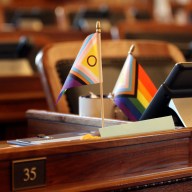Reporter was commissioned to write this in-depth article.
 Nearly five years have passed since the Citizens United ruling.
Nearly five years have passed since the Citizens United ruling.
CREDIT: THINKSTOCK
The United States is approaching the five-year mark since the Citizens United Supreme Court ruling. Its long-term effects on U.S. politics are yet to be seen – but that hasn’t kept politicians and voters alike from chiming in both for and against it.
In a nutshell, the ruling allowed corporations, unions and individuals to make unlimited independent expenditures during a given election cycle. This, in turn, opened the floodgates for unlimited contributions.
“It’s clear that, for better or for worse, Citizens United has kind of unleashed spending on political campaigns in American politics,” said Meena Bose, Hofstra University political science professor and director of the Peter S. Kalikow Center for the Study of the American Presidency.
Few can argue that in the last two election cycles, the ruling hasn’t changed the political landscape. According to The American Prospect, new research reveals that total super PAC donations increased tenfold between the 2010 and 2012 elections. Translation: Super PACs generated roughly $828 million in 2012, according to the report.
Super PACs (short for “political action committees”) can raise unlimited funds, but are prohibited from directly coordinating with candidates or political parties.
“When you look at campaign finance in the abstract, you see this kind of cyclical pattern,” said Bose. “There’s spending, there’s issues that raise ethical concerns or fairness concerns, then legislation is passed, and then you have a loophole.”
According to Bose, proponents of the Citizens United ruling argue that fewer restrictions are better because regulations create the opportunity for more loopholes. (Whether the nation moves into another period of regulation remains yet to be seen.) Another advantage of independent expenditures is that it means that candidates are not necessarily beholden to their political parties in the same ways they are in other democracies.
Even so, the sky-high donations unleashed since Citizens United are leading many to question the ruling’s fairness.
“How do we ensure that the playing field is fair?” said Bose. “How do we define fairness in a way that voters have confidence in the system, and candidates are willing to run for office?”
According to Nancy Argenziano, former Florida PSC Chair and GOP State Senator, contributions of this scale have the power to sway political decisions and cloud judgment.
The Florida Public Service Commission (PSC) is tasked with regulating the state’s electric, natural gas, telephone, water and wastewater. Argenziano says that the legislature takes millions in contributions from the utilities that the PSC is supposed to regulate. What’s more is that an increasing number of critics are piping up about corruption in the PSC that goes beyond money.
For example, controversy is currently swirling over a 2012 settlement of a Florida Power & Light Company (FPL) rate case. The PSC, which served as the impartial judgein the case, granted FPL a deal that increases utility rates for customers.
“When I was at the PSC, a senior member of the staff – I won’t mention who it was – commented once that we know who we work for. We work for Florida Power & Light,” said Argenziano. “And I was flabbergasted that someone on the PSC staff would say something like this.”
In Argenziano’s opinion, politicians and public servants “are getting their palms greased everywhere.” This type of corruption runs deep, according to Argenziano. Case in point: the Sabal Trail pipeline, a roughly 500-mile natural gas pipeline slated to run through Alabama, Georgia and Florida. Many residents hotly oppose the pipeline because of fracking and other environmental concerns.
The Florida PSC first denied the pipeline in 2012. But in 2013, after Gov. Rick Scott took office, the project was eventually approved.
According to a Reuters report, Florida Power & Light has donated a combined $1.2 million to Scott’s PAC and the Republican Party of Florida. This, in addition to the fact that new members were appointed to the PSC before the Sabal Trail pipeline was green lighted, leads Argenziano to believe that the agency’schange of heart was less than pure.

















